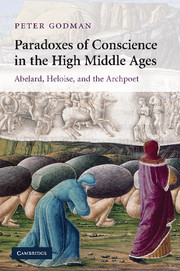Book contents
- Frontmatter
- Contents
- Preface and acknowledgements
- List of abbreviations
- 1 Moral moments
- 2 The neurotic and the penitent
- 3 True, false, and feigned penance
- 4 Fame without conscience
- 5 Cain and conscience
- 6 Feminine paradoxes
- 7 Sincere hypocrisy
- 8 The poetical conscience
- Envoi: Spiritual sophistry
- Bibliography
- Index of quotations
- General index
- CAMBRIDGE STUDIES IN MEDIEVAL LITERATURE
6 - Feminine paradoxes
Published online by Cambridge University Press: 30 September 2009
- Frontmatter
- Contents
- Preface and acknowledgements
- List of abbreviations
- 1 Moral moments
- 2 The neurotic and the penitent
- 3 True, false, and feigned penance
- 4 Fame without conscience
- 5 Cain and conscience
- 6 Feminine paradoxes
- 7 Sincere hypocrisy
- 8 The poetical conscience
- Envoi: Spiritual sophistry
- Bibliography
- Index of quotations
- General index
- CAMBRIDGE STUDIES IN MEDIEVAL LITERATURE
Summary
Abelard's autobiography takes its place in a tradition of therapeutic writing about the self, yet nothing in Latin literature is quite like it. As original and idiosyncratic as its author, the HC has no immediate model nor any direct descendants. It stands alone in the singularity with which it depicts Abelard's moral metamorphoses. At the end of the work he ceases to play Proteus, finding a stable identity as an adherent to monastic values. This has consequences for the other characters in his ethical drama. If the reader is drawn onto the scene, not much room is made for the leading lady. Heloise no longer occupies centre-stage. Styling himself her spiritual guide, Abelard highlights the religious character of their relationship. Its other aspects are consigned to the past. But where did that leave her in the present? If he had refashioned his role, what was hers?
An answer to these questions is formulated, brilliantly, in the words of greeting (salutatio) with which Heloise's first letter to Abelard plays on the philosopher's taste for paradox:
To her lord Abelard or rather her father, to her husband or rather her brother, his handmaiden or rather his daughter, his wife or rather his sister Heloise.
Perhaps reminiscent of a triad attested in Roman poetry, this salutatio is certainly provoked by Abelard's description of Heloise as ‘now our sister in Christ rather than our wife’ in the HC. Against his emphatic potius is set her understated immo.
- Type
- Chapter
- Information
- Paradoxes of Conscience in the High Middle AgesAbelard, Heloise and the Archpoet, pp. 119 - 137Publisher: Cambridge University PressPrint publication year: 2009



